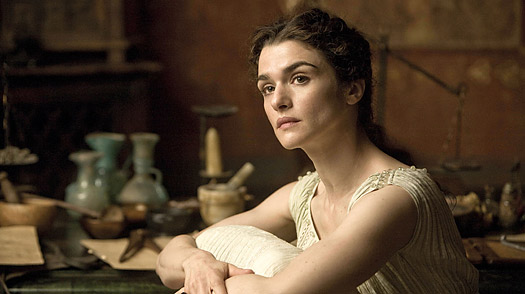
Rachel Weisz stars in Agora.
They've spent 10 days indoors, rushing from film to press conference to computer room, processing dozens of the many hundreds of movies screened for review or purchase. Today, though, as suspense builds toward Palme Sunday — tomorrow evening's announcement of the prizes — those who remain of the 30,000 professionals at the 62nd Cannes Film Festival finally have time to pursue the regimen of most tourists in this Code d'Azur resort: enjoy a leisurely meal, wander through the local flea market, perhaps rent a mattress at one of the beach cafés and bask in the Riviera sunshine.
We think basking is for wimps. Besides, we have a few films to report on: movies whose reviews got delayed as we covered the brand-name films, the Tarantino and Almodovar and Heath Ledger efforts, but which are worth mentioning and are all eligible for the prizes handed out at the Palme ceremony. The awards could go to one of the films below or to another critics' favorite, the Jacques Audiard prison drama Un Prophete. We'll have analysis of the prizes, and the entire festival, around 5 p.m. U.S. Eastern time Sunday right here on TIME.com.
Agora
A cinematic rarity, Alejandro Amenabar's latest is an epic movie, set in antiquity, whose hero is a woman: the Egyptian astronomer and philosopher Hypatia (Rachel Weisz), who may have been the first to determine that the Earth moves in an elliptical orbit around the sun, and that man is thus not the center of the universe. No stranger to playing ancient royalty — she was Princess Nefertiti in The Mummy and Queen Isabella in The Fountain — Weisz lends intelligence and grandeur to this long, thoughtful work of historic and cinematic revisionism.
Amenabar (The Others, The Sea Inside) argues that organized religion gives men the excuse of idealism to spur their domination of others. Here, the Christians, having emerged from a rebel minority to the power elite, take revenge on the Pagans who have enslaved them. They then destroy the Alexandria Library, the Pagans' source of all knowledge; these zealots might be the Taliban with the Buddhas of Bamyan statues or the U.S. Army with Saddam's statue in Baghdad. Whoever they are, whatever their mission, the winners must eradicate old deities. In its stately way, Agora is just as iconoclastic. It does without a big love story and rejects the clichés of machismo; and it dares to suggest that, in an epic saga, a woman can be every bit as heroic with her questioning mind as a man is with his weapons. —M.C.
Map of the Sounds of Tokyo
Three years after impressing Cannes as the dead-mute teenager in Babel, Rinko Kikuchi returns, all grown up, to play a Tokyo contract killer in the appealing new drama from Spanish director Isabel Coixet. Tough enough to gun down strangers, yet with sufficient sensitivity to visit and clean their tombstones, Ryu makes a fatal mistake for an assassin: she falls in love with her designated victim. David (Sergi Lopez, the vicious soldier in Pan's Labyrinth) has been fingered by his late girlfriend's father, who believes his daughter was driven to suicide because David broke her heart. He touches Ryu's heart, though, and other parts of the young woman, in discreetly steamy love scenes played out in one of the city's Love Motels. Director Coixet convincingly shows how loneliness and the need for human warmth can produce strange and abiding bedfellows.
In
Enter the Void
Cannes hadn't shown a really scandalous movie in ages — it had been four or five days since the screening of Lars von Trier's mutilation medley
As children, separated after the car-crash deaths of their parents, Oscar and Linda had made a solemn oath to take care of each other, forever. (In this nonstop depiction of grimy, hard-core sex, the one time the public audience gasped was when the little girl cuts her finger for the blood pact.) So when Oscar is killed in the aftermath of a drug deal, his spirit returns to haunt and protect Linda. That cues a lot of long overhead tracking shots, meant to suggest a portmortem psychedelic state. Some of it is effective, most isn't. Say this for Noe: he keeps searching for ways not just to torture his audience but to expand the boundaries of cinema. And Enter the Void was shown as a work in progress. It needs a lot more work. But if he cuts it down by an hour, the movie might be a tonic challenge, not an ordeal. —R.C.